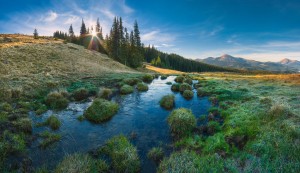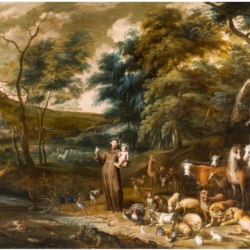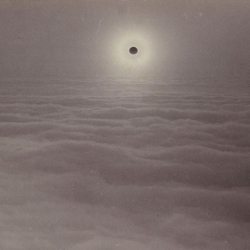If me’ilah means that you can’t use property that’s sanctified, that’s because sanctified property must be used for a sacred purpose and it must be used by the priests. So if saying a brakhah changes the status of something so that you can now eat it, what status is the brakhah changing? Is it turning the food into something that’s no longer sacred and can therefore be used by an ordinary person (a הֶדיוֹט “hedyot“)? OR, is it turning the person from a hedyot into a priest?
I think it means that by saying a blessing before we eat–or before we take in any pleasure that has a brakhah–we become like priests administering to Creation, which means we take on an awesome responsibility: that we should act not just for our own sake but for the sake of all people and all beings. That’s the role of the priest in the Temple.
May we be blessed that we all merit to really see the world through such eyes, and that our every act of eating, of taking, from this world, be an act of sanctification and blessing — meaning, not just blessing God, but bringing blessing, to all the creatures that we share this planet with. Or, in Rabbi Moshe Cordovero‘s words, זֶה הַכְּלָל, הַחֶמְלָה עַל כָּל הַנִּמְצָאִים שֶׁלֹּא לְחַבְּלָם, תְּלוּיָה בְּחָכְמָה — may we live and work and act so that our actions “cause life to stream forth, to all beings.”[1] Find chapter three of the RAMAK’s Tomer Devorah, here.
| Source (Hebrew) | Translation (English) |
|---|---|
תלמוד בבלי ברכות כה א׳ – ברכות כה ב׳ |
Talmud Bavli Tractate Brakhot 35a-b |
מתני׳ כיצד מברכין על הפירות? על פירות האילן הוא אומר בורא פרי העץ, חוץ מן היין; שעל היין הוא אומר בורא פרי הגפן. ועל פירות הארץ הוא אומר בורא פרי האדמה, חוץ מן הפת; שעל הפת הוא אומר המוציא לחם מן הארץ. ועל הירקות הוא אומר בורא פרי האדמה. רבי יהודה אומר בורא מיני דשאים: |
MISHNAH What blessing do we say over fruit? Over the fruit of trees, one says, “[Blessed are you, YHVH our elo’ah, cosmic majesty] Who forms the fruit of the tree,” except over wine; for over wine one says, “…Who forms the fruit of the vine.” Over the fruits of the Earth one says: “…Who forms the fruit of the ground,” except over bread; for over bread one says, “…Who brings forth bread from the Earth.” Over vegetables one says, “…Who forms the fruit of the ground”; but Rebbi Yehuda declares: “…Who forms diverse kinds of herbs (desha’im).” |
גמ׳ ת”ר אסור לו לאדם שיהנה מן העולם הזה בלא ברכה וכל הנהנה מן העולם הזה בלא ברכה מעל. מאי תקנתיה? ילך אצל חכם! ילך אצל חכם מאי עביד ליה הא עביד ליה איסורא? אלא אמר רבא: ילך אצל חכם מעיקרא וילמדנו ברכות כדי שלא יבא לידי מעילה |
GEMARAH […] Our Rabbis have taught: A person is forbidden to enjoy anything of this world without a blessing, and whoever does so commits sacrilege. What is the remedy? Let them go to a Sage. Let them go to a Sage! What can they do for them, seeing that they have done what is forbidden? But, said Rava: [The meaning is,] let them from the first go to a Sage who will teach them the blessings, so that they should not come to commit sacrilege. |
אמר רב יהודה אמר שמואל: כל הנהנה מן העולם הזה בלא ברכה כאילו נהנה מקדשי שמים שנאמר (תהלים כד:א) לה׳ הארץ ומלואה. ר׳ לוי רמי: כתיב לה׳ הארץ ומלואה וכתיב (תהלים קטו:טז) השמים שמים לה׳ והארץ נתן לבני אדם! לא קשיא; כאן קודם ברכה, כאן לאחר ברכה. א”ר חנינא בר פפא: כל הנהנה מן העולם הזה בלא ברכה כאילו גוזל להקב”ה וכנסת ישראל שנאמר (משלי כח:כד) גוזל אביו ואמו ואומר אין פשע חבר הוא לאיש משחית — ואין אביו אלא הקב”ה שנאמר (דברים לב:ו) הלא הוא אביך קנך; ואין אמו אלא כנסת ישראל שנאמר (משלי א:ח) שמע בני מוסר אביך ואל תטוש תורת אמך. מאי חבר הוא לאיש משחית? א”ר חנינא בר פפא: חבר הוא לירבעם בן נבט שהשחית את ישראל לאביהם שבשמים: |
Rav Yehudah said in the name of Shmuel: Whoever enjoys anything of this world without a blessing is as though he had partaken of the holy things of Heaven; as it is said, “The Earth is for YHVH and the fullness thereof” (Psalms 24:1). Rav Levi asked: It is written, “The Earth is for YHVH and the fullness thereof,” and it is written, “The heavens are the heavens of YHVH, but the Earth he has given to the children of Adam” (Psalms 115:16)! There is no contradiction; the former passage referring [[fol. 35 b.]] to before the blessing [has been uttered], the latter to after the blessing. Rav Ḥannina bar Pappa said: Whoever enjoys anything of this world without a blessing is as though he robbed the blessed Holy One and the Community of Israel; as it is said, “Whoso robs his father or his mother and says, It is no transgression, the same is the companion of a destroyer” (Proverbs 28:24) — “father” is none other than the blessed Holy One; as it is said, “Is not He your father that has acquired you?” (Deut. 32:6); and “mother” is none other than the Community of Israel; as it is said, “Hear, my son, the instruction of your father, and forsake not the teaching of your mother” (Proverbs 1:8). What means “the companion of a destroyer”? Rav Ḥannina bar Pappa said: He is the companion of Yerovam the son of Nevat, who corrupted Yisrael against their Father in Heaven. |
In 2015, Rabbi David Seidenberg published a work germinating for ten years or more — Kabbalah and Ecology, an eco-theology deeply rooted in ideas developed within Judaism’s esoteric tradition. The entire work is available for purchase from Cambridge University Press. (An introduction to the book can be read here.)
We have presented here a teaching that Rabbi Seidenberg shared over the neoḥasid announcement listserve, “Chasidus w/o Borders” in 2013 just prior to the book entering its final phase of editing. Separately, I have added chapter three of Rabbi Moshe Cordovero’s Palm Tree of Devorah, on conducting oneself in accord with the sefirah of Ḥokhmah (Wisdom). –Aharon N. Varady

“The Earth is Our Temple, a d’var tefilah on making blessings over foods by Rabbi David Seidenberg (neohasid·org)” is shared through the Open Siddur Project with a Creative Commons Attribution-ShareAlike 4.0 International copyleft license.









